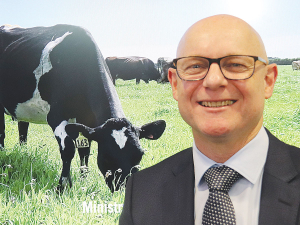NZ Catchment Groups Thrive with ‘Source to Sea’ Approach
The most successful catchment groups in NZ are those that have 'a source to sea' approach.
 Ray Smith is impressed with what the Irish are doing in bringing applied science to and engaging with farmers.
Ray Smith is impressed with what the Irish are doing in bringing applied science to and engaging with farmers.
MPI director general Ray Smith reckons NZ has a lot to learn from the Irish Agriculture and Food Development Authority – called Teagasc (pronounced ‘Chog us’).
Teagasc is an organisation that looks like what the old MAF did until it was remodelled back in the 1980s and 1990s. Before then MAF provided advisory services to farmers, did actual research and gave policy advice to government. There was a direct line between farmers, researchers and policy makers.
Teagasc does all these things, including running field days for farmers all around Ireland, which regularly attract thousands of farmers and rural professionals.
Smith was recently in Ireland where he met with top officials from Teagasc. He told Rural News that he was amazed with what the Irish are doing in bringing applied science to and engaging with farmers. He believes NZ could learn from that.
Smith was impressed by the way Teagasc staff were engaging with farmers and trying to help them with the same issues that NZ has – such as climate change and nitrogen in waterways.
“I think they had a very good plan and I’d like to steal some of their ideas.”
Smith liked the way Teagasc staff talked with farmers to find solutions and also its move to lift education levels. He says the two countries have the same problems and are trying to find solutions and already a lot of good collaboration is taking place.
Smith believes one of the challenges worldwide is getting a common understanding and a narrative that is common to all on these issues.
“We need to have a common language and understanding of what all this means. I feel we have quite a lot of work to do with our farmers and growers to make sure we are all on the same page.”
Smith adds that in addition to the collaboration already taking place with Ireland, good work is also being undertaken in the UK and the EU – primarily as a result of the recent FTAs.
“I think the signing of the FTA agreements has really broken the back of what has sometimes been a challenging relationship,” he adds. “There is a real warmth and a willingness to share and willingness to listen and learn about NZ.”
China Recovery
Following his trip to Europe, Smith made a separate trip to China.
Here he met with his counterparts in the Chinese government who deal with agriculture, rural affairs, customs and the imports of infant formula.
Smith says his engagement with these influential government officials could not have been warmer and he adds that both parties are working closely together to improve our respective systems and trading relationships.
He believes the Chinese economy is slowly recovering after the Covid lockdowns, which saw China’s consumers adopt conservative spending patterns. He says the situation is slowly starting to change and that the higher prices at recent GDT auctions are an indicator of this.
Smith adds that there are hundreds of thousands of Chinese people growing into the middle class.
“We just have to be involved in China for the long run and my message to farmers is to just be patient, and while there may be dips from time to time, things will come right.”
Farmers are being encouraged to take a closer look at the refrigerants running inside their on-farm systems, as international and domestic pressure continues to build on high global warming potential (GWP) 400-series refrigerants.
As expected, Fonterra has lifted its 2025-26 forecast farmgate milk price mid-point to $9.50/kgMS.
Bovonic says a return on investment study has found its automated mastitis detection technology, QuadSense, is delivering financial, labour, and animal-health benefits on New Zealand dairy farms worth an estimated $29,547 per season.
Pāmu has welcomed ten new apprentices into its 2026 intake, marking the second year of a scheme designed to equip the next generation of farmers with the skills, knowledge, and experience needed for a thriving career in agriculture.
One team with 43 head, including a contingent from Mid Canterbury, are reflecting on a stellar NZ DairyEvent.
Fonterra farmer shareholders have approved the mechanism for a $2/share capital return expected from the sale of its global consumer and associated businesses.

OPINION: Here w go: the election date is set for November 7 and the politicians are out of the gate…
OPINION: ECan data was released a few days ago showing Canterbury farmers have made “giant strides on environmental performance”.